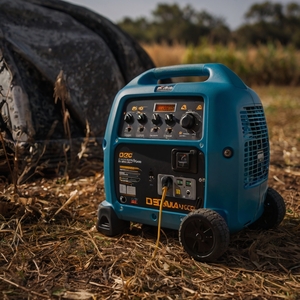Portable Generator Market: Pros and Cons
Publicado por Mark Smith
Cuerpo
The portable generator market creates electricity by employing gas, diesel, or propane engines. It aims to drive an onboard alternator that transforms mechanical power into electrical energy. This generator includes power outlets for plugging in appliances or extension cords. Portable home models usually deliver outputs between 3 and 10 kW.
The portable generator market is a useful solution for emergency power. It provides cost-effectiveness and flexibility that appeal to many users. Nevertheless, they do have limitations regarding power capacity and maintenance needs.
Moreover, safety considerations are important factors to take into account. Deciding whether a portable generator is suitable for you depends on the specific power requirements. It is also according to your ability to maintain the equipment and commitment to safe operation. For individuals who determine it is the right choice, a portable generator might help mitigate disruption caused by power outages. It allows essential services to function seamlessly.
The Benefits
The portable generator market size is increasingly expanding as many people recognize its importance.
A portable generator is much more affordable in comparison to a permanently installed one. It depends on the wattage. They are available for purchase online, at hardware stores and in major retail chains.
Portable generators are primarily designed for emergency backup. It is particularly during power outages caused by minor natural disasters. With a power output of 3 to 10 kW, these generators can support essential household items. That includes lights and a heater. A portable generator can be essential at a job site for powering tools. It can also be useful for powering appliances while camping.
Portable generators are built for easy mobility. Unlike permanent models, they can be utilized in different locations. That makes them perfect for outdoor events and construction projects. They have a quick startup time and require little setup. It offers immediate power relief when necessary.
They operate on multiple fuel types. That includes gasoline and diesel. They can also work on natural gas or propane. It allows users to select based on what is available and their personal preferences. This flexibility can be especially advantageous in regions where specific fuels are more affordable or easier to find.
Even though it is extremely valuable, the portable generator market also possesses some weaknesses.
It is crucial to keep it outside to prevent poisoning because of carbon monoxide. However, it is vital to remember that the generator will be within the length of an extension cord from your home. It emits unpleasant exhaust heat and noise.
Because of its lower wattage, it has limited applications. It will not be able to power the entire home or high-demand items like central AC or large-screen TV. While ideal for short-term applications, portable generators generally cannot supply large power. They are most effective for essential appliances so users must prioritize which devices to operate during a power outage.
In contrast to a stationary generator, it does not automatically activate during a power outage. It thereby requires a manual startup.
Handling fuel can be tricky since diesel and gasoline need to be stored properly and have a limited shelf life. Additionally, portable generators need routine maintenance to operate effectively. That includes oil changes and inspecting components.
The portable generator market is a useful solution for emergency power. It provides cost-effectiveness and flexibility that appeal to many users. Nevertheless, they do have limitations regarding power capacity and maintenance needs.
Moreover, safety considerations are important factors to take into account. Deciding whether a portable generator is suitable for you depends on the specific power requirements. It is also according to your ability to maintain the equipment and commitment to safe operation. For individuals who determine it is the right choice, a portable generator might help mitigate disruption caused by power outages. It allows essential services to function seamlessly.
The Benefits
The portable generator market size is increasingly expanding as many people recognize its importance.
1. Cost efficient
A portable generator is much more affordable in comparison to a permanently installed one. It depends on the wattage. They are available for purchase online, at hardware stores and in major retail chains.
2. Backup for emergency
Portable generators are primarily designed for emergency backup. It is particularly during power outages caused by minor natural disasters. With a power output of 3 to 10 kW, these generators can support essential household items. That includes lights and a heater. A portable generator can be essential at a job site for powering tools. It can also be useful for powering appliances while camping.
3. Convenient and flexible
Portable generators are built for easy mobility. Unlike permanent models, they can be utilized in different locations. That makes them perfect for outdoor events and construction projects. They have a quick startup time and require little setup. It offers immediate power relief when necessary.
4. Various fuel choices
They operate on multiple fuel types. That includes gasoline and diesel. They can also work on natural gas or propane. It allows users to select based on what is available and their personal preferences. This flexibility can be especially advantageous in regions where specific fuels are more affordable or easier to find.
The Weaknesses
Even though it is extremely valuable, the portable generator market also possesses some weaknesses.
1. Noise and heat
It is crucial to keep it outside to prevent poisoning because of carbon monoxide. However, it is vital to remember that the generator will be within the length of an extension cord from your home. It emits unpleasant exhaust heat and noise.
2. Application limitation
Because of its lower wattage, it has limited applications. It will not be able to power the entire home or high-demand items like central AC or large-screen TV. While ideal for short-term applications, portable generators generally cannot supply large power. They are most effective for essential appliances so users must prioritize which devices to operate during a power outage.
3. Manual start
In contrast to a stationary generator, it does not automatically activate during a power outage. It thereby requires a manual startup.
4. Fuel storage
Handling fuel can be tricky since diesel and gasoline need to be stored properly and have a limited shelf life. Additionally, portable generators need routine maintenance to operate effectively. That includes oil changes and inspecting components.














Comentarios